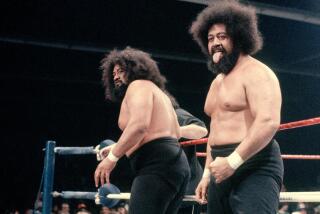Fonoimoana Makes Motivational Tale
- Share via
Years before he became a pro beach volleyball star, what seemed a lifetime before he won an Olympic gold medal, Eric Fonoimoana received a phone call.
He had just returned to his apartment after volleyball practice at UC Santa Barbara, where he was a sophomore with promise and potential.
On the other end of the line was a familiar voice--that of his older brother, Toa. But what Toa was saying didn’t make sense.
Their mother, Connie, had been in an accident. Fonoimoana needed to come home to Hermosa Beach right away.
Somewhere between the first and final words of the two-minute conversation, Eric Fonoimoana’s life changed forever.
*
Fonoimoana, 33, is a serious type. One of the top players on the Assn. of Volleyball Players Tour, he is known for his tireless training regimen and his no-nonsense attitude with his beach partners.
One of the fittest players on the sand, Fonoimoana might also be the most impatient: He won the gold medal with Dain Blanton at the 2000 Sydney Olympics, then dropped him less than a year later after a few unsuccessful tournaments together.
It’s a mind-set that dates to his days at Mira Costa High in Manhattan Beach. The youngest of six kids, all of whom attended Mira Costa, he arrived with the burden of trying to live up to standards set by his siblings.
One of his sisters, Le Lei, was a world-class swimmer who competed in the 1976 Montreal Olympics. Another sister, Debbie, played volleyball at UCLA. Toa played water polo at UCLA.
Eric’s niche was volleyball. He practically had plans for his career laid out in his first year of high school.
“Everything he did, he went about with a purpose,” said longtime Mira Costa volleyball Coach Mike Cook.
Fonoimoana excelled at Mira Costa and in 1988 became the first freshman to start at UC Santa Barbara, helping the Gauchos advance to their first NCAA championship. They lost to USC in five games, but big things were expected from the Gauchos and Fonoimoana.
Then came the phone call from his brother in September 1988.
Connie Fonoimoana had fallen while trying to catch a bus in Manhattan Beach. She had been running alongside the bus and tripped. The bus rolled over her midsection and caused severe internal damage that required numerous blood transfusions.
Looking back, Fonoimoana thinks his family hid the severity of the accident so he would stay in school and continue his athletic development.
After all, his father, Alio, didn’t even want to tell him about the accident the day it happened.
“My dad didn’t want to bother him,” Toa Fonoimoana said. “I said, ‘That’s ridiculous. That’s mom’s favorite son.’ ”
So Toa made the call. And although Fonoimoana went home, his family persuaded him to return to school within a week. It’s what mom would have wanted, they said.
He returned home every other week, his mother’s condition neither improving nor deteriorating. He looked forward to spending time with her at the end of the fall quarter.
“When I was coming home for Thanksgiving,” Fonoimoana said, “I was told she didn’t make it. I thought I was coming home and she was coming out of the hospital, but there was pretty much no chance.”
She died Nov. 24, 1988, two months after the accident. It was Thanksgiving Day.
He returned to Santa Barbara for school and volleyball. The Gauchos weren’t as good as expected, but Fonoimoana made a name for himself by becoming a hard-swinging outside hitter.
And by simply showing up.
“It amazed me,” said Ken Preston, who has coached UC Santa Barbara for 23 seasons. “I couldn’t believe he finished the season. He did it obviously for his mom.”
Said Fonoimoana: “I had this feeling that she was around me and I needed to impress her.”
By the time he was a senior, Fonoimoana had become the focus of the offense and was a second-team All-American.
A month after volleyball season ended, UC Santa Barbara held its graduation day. Although he had earned a degree in sociology, Fonoimoana was not there. He was at an AVP tournament in Chicago, one of his first events as a pro.
*
Eric’s father, Alio , was a disciplinarian. The youngest of 13 kids, he had a rough-and-tumble upbringing. He moved away from his family at 18 and began working as a plumber.
He married Connie and was in charge of lining up chores for the kids ... and meting out punishment, if necessary.
“You didn’t do anything [halfway] or he’d catch you,” Eric said. “If he did, it wasn’t a fun ordeal. They were not fun spankings. The belt was always his preferred weapon of choice. There was no talkback. Nowadays, they probably call it abuse.”
And yet, Alio occasionally showed his softer side, particularly when his kids were playing sports. Sometimes he let loose a playful demeanor on the family’s annual skiing trip.
It was moments like those that Fonoimoana remembered a few years ago, in the presence of his ailing father.
Alio was diagnosed with liver cancer in 1997. He refused medical treatment and hid his condition from his sons and daughters. He continued to work, brushing off questions about his weight loss and increased fatigue.
“He didn’t want to worry anybody,” said Kirk Fonoimoana, another brother. “It was his burden.”
Alio finally told his family members in January 1998, about four months after he had been diagnosed.
“I made sure when I went over there that I wouldn’t cry,” Fonoimoana said. “He wouldn’t allow it.”
To the end, Alio refused to go to a hospital. Only in the final weeks did he accept painkillers. He died that year on Father’s Day.
“When it was all said and done, it was like he was at peace,” Fonoimoana said. “One of the last things he said to me was, ‘I want you to continue playing.’ ”
*
Fonoimoana, in his 11th year on the AVP Tour, has been to the finals with Dax Holdren in four of five AVP tournaments this season, winning twice. The Chicago event begins today. The season finale, the Las Vegas Open, is Sept. 5-7.
Though the Olympics are two years away, Fonoimoana and Holdren could be one of two U.S. teams in Athens.
That Fonoimoana made it to the Sydney Olympics, let alone won a gold medal, was improbable. Fonoimoana and Blanton passed Adam Johnson and Karch Kiraly for the last U.S. spot at the final Olympic qualifying tournament.
Kiraly had dislocated his shoulder earlier in the tournament, and Fonoimoana and Blanton took advantage.
Then they stunned the beach volleyball world at the Olympics, turning emotion and intensity into a gold medal by winning five consecutive matches.
They were penalized by referees for arguing calls, slapped away balls in anger and engaged in shouting matches with opponents, but managed to maintain a laser focus and defeated Ze Marco de Melo and Ricardo Santos of Brazil, 12-11, 12-9, for the gold medal.
All the while, Fonoimoana kept the story of his life shackled. NBC would have loved to broadcast it to the world, piano keys tinkling in the background, but Fonoimoana told no media members about his past.
“Self-pity was not something I wanted to portray,” he said. “I didn’t want people out there feeling sorry for me.”
Fonoimoana did, however, reflect on his parents after he won the medal.
“I went to the Olympics with my mother and father’s spirit ... knowing they were with me win or lose,” he said. “They’re always around me. The presence of mind that they’re around makes it a lot easier to continue day to day.”
Fonoimoana says he now has reasons to go public with his past. It has to do with his experiences since he founded a charity, Dig for Kids, that gives academic guidance--and volleyball lessons--to children from mostly low-income families.
“If someone sees this story and says, ‘I didn’t know other people had these problems as well,’ maybe they can turn mishaps into successes,” he said. “Maybe some kid sees it and says, ‘I don’t have it half bad.’
“There’s a lot of bad things that have happened to me. But I’m extremely focused in what I do. I think it’s pretty powerful what I can convey to people: Believe in anything.”
More to Read
Go beyond the scoreboard
Get the latest on L.A.'s teams in the daily Sports Report newsletter.
You may occasionally receive promotional content from the Los Angeles Times.







